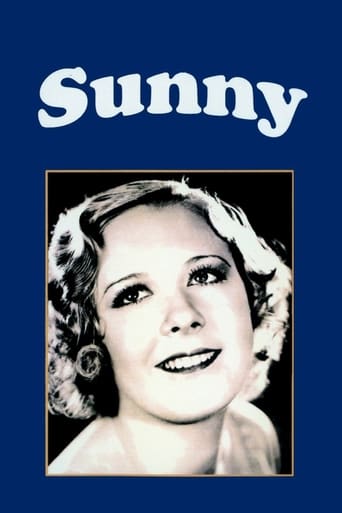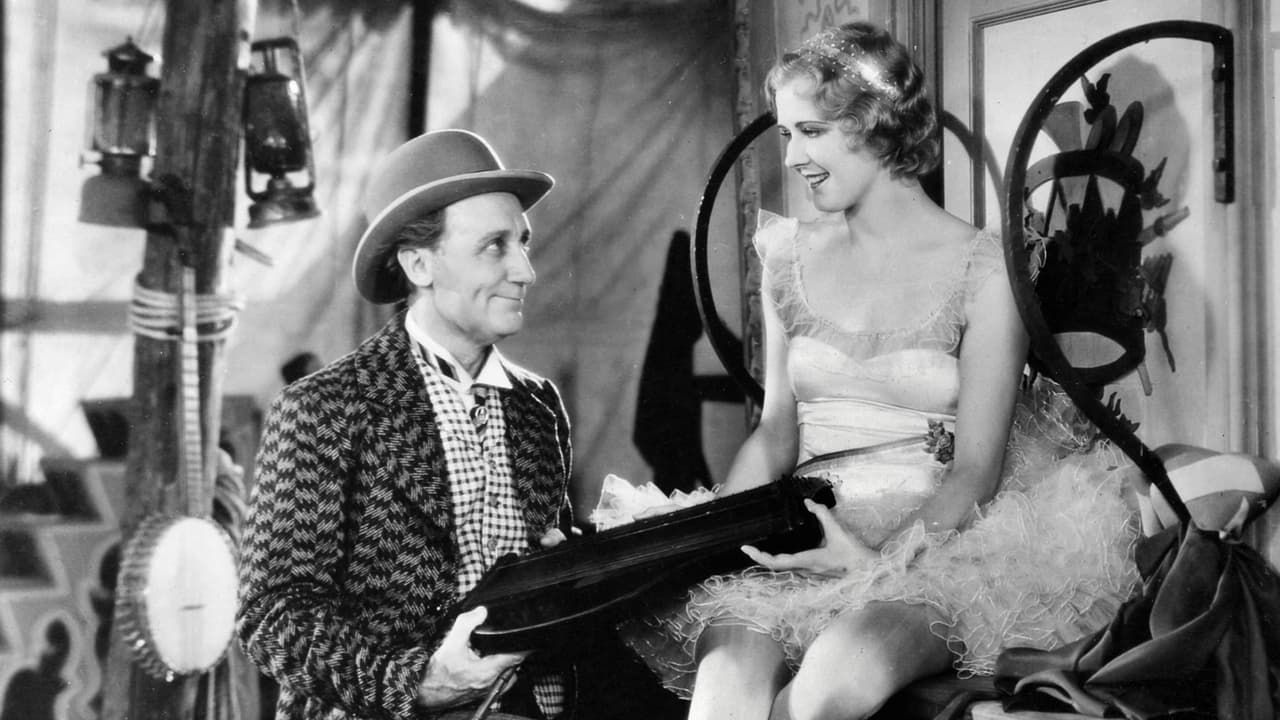GManfred
That about sums it up. We can gain no further insight as to what made her such a legendary performer from "Sunny", a creaky old movie billed as a musical but with precious little music. As noted by other reviewers, only "Who" remains from the original work, and most of the omitted songs were written by Oscar Hammerstein and Jerome Kern.So here is Marilyn, smiling and of cheerful demeanor, caught in a poorly written screenplay which has been further vandalized by subsequent generations of distributors and made slightly incoherent, as pieces of scenes have evidently been cut out of the original. As is, the story is far-fetched with stale, poorly-delivered jokes and with very stagey acting.That leaves us to judge Marilyn's talent, but that, too, is a chore. In contrast to her first film, "Sally", here she sings better than she dances, horsing about the stage and appearing dumpy and out of shape. She does better in a duet dance with Tom Donahue, who nearly carries the whole picture appearing in almost every scene.Too bad she couldn't have been given a picture that really did her justice. The sound accompanying this movie was awful, and it could be that it was just too early in the sound era, as well as for musicals themselves. There is still one more Marilyn Miller film left that I haven't seen, and I'll hope for the best.
MartinHafer
The Vitaphone/Warner Brothers folks were the foremost studio when it came to sound. Because of that, I was a bit confused when I watched "Sunny" as the sound was really, really bad. It seriously sounded as if the sound was recorded in a telephone booth--and you were outside trying to listen! Fortunately, the version shown on Turner Classic movies IS captioned and I strongly advise you to turn on your television's captioning for this film. You'll need it! "Sunny" stars Marilyn Miller--a very talented Broadway star who only made three early sound films before dying at age 37! The film begins with Miller feeling fed up with life in the circus and she disappears dressed as a man. She then stows away on a ship bound for America--not realizing her father is in pursuit. He is determined that she should marry a rich but dreadfully dull Brit--who Marilyn keeps referring to as 'the fish'. Can she manage to make it to America or is it an unhappy marriage to a weenie instead? While this film is a bit antiquated, you can clearly see the formula that would become the norm in future musicals of its type. The film features a few songs (actually not that many for a musical) and several dance numbers from Miller. And, true to the formula, a bit of comic relief to keep the overall mood very light. If it weren't for the bad sound, I'd strongly encourage you to see it. In its present form, however, it's one you might just want to skip.By the way, in the wedding scene on the ship, how did they get a bridal gown for Miller and all the bridesmaids? After all, they were in the middle of the ocean and the wedding was unplanned!!
lugonian
SUNNY (First National, 1930), directed by William A. Seiter, stars the legendary Marilyn Miller (1898-1936) in her second screen appearance following her motion picture debut as SALLY (1929). Along with SALLY, SUNNY is a reworking of a Broadway play starring Miller which unfortunately did not acquire the same care and production values as her preceding film. Released at the time when musicals were on the wane, SUNNY eliminated most of the original score, leaving much of it, including the title tune, to background music. With a handful of Broadway to Hollywood musicals produced during the early sound era (1929-30), consisting of romantic lovers, secondary "comedy relief" couple, society and character types, situations and misunderstandings leading to song interludes for moderate entertainment, SUNNY is basically more of the same, yet tolerable.Miller plays Sunny Peters, a bareback rider of the Royal Continental Circus in Southampton, England, where "Wendell Wendell's circus was not so good, but loud." An hour before sailing for New York, Tom Warren (Lawrence Gray), an old acquaintance of Sunny during the war, pays her a visit. While Sunny still admires Tom, he's now engaged to débutante Margaret Manners (Barbara Bedford). Sunny's father (O.P. Heggie) has already arranged for her to marry Harold Harcourt Wendall-Wendall (McKenzie Ward), a "fish" whom she doesn't love. In order to keep from marrying Wendall, Sunny, disguised in boys attire, breaks away from the circus and heads over to the dock where she sneaks on board ship that's "five seasick days from New York," taking refuge in the cabin of Tom's pal, Jim Denning (Joe Donahue). Discovered a stowaway, passengers agree to help pay her passage and new wardrobe. As for Sunny's father, who had come to find Sally, has accidentally made his way on board while "waiting for the lady with the money for the dog," and is forced to pay his passage by scrubbing the deck. Because Sunny has no passport and to be sent back after the ship docks, she manages to remain in the states by marrying Jim, with the agreement of divorcing him after-wards so he can be free to wed the love of his life, Weenie (Inez Courtney). For their wedding present, "Jim gets his gym while Sunny's idea was to get rid of her Jim." After Sunny takes part in a society fox hunt at the Pine Crest estate, situations become more complex between her and Tom.While SUNNY originally included the popular songs originated from the Broadway production, what survives in this screen adaptation, by Otto Harbach, Oscar Hammerstein II and Jerome Kern, are as follows: "Oh, Did He Ramble" (sung by Lawrence Gray and friends); "Who?" (sung by Marilyn Miller and Lawrence Gray); "I Was Alone" (sung by Marilyn Miller, reprized and danced by Miller); "When We Get Our Divorce" (instrumental dance by Miller and Joe Donahue); and "The Hunt Dance" (instrumental dance by Miller). Aside from title song not existing in final print, "Do Ya Love Me" (performed by Joe Donahue and Inez Courtney), sometimes credited as part of the movie, is not presented in available prints.SUNNY shows off its theatrical origins with its song numbers, especially during the lively dance sequence of "I Was Alone" where Miller takes center stage tap dancing while the boat passengers observe facing the camera watching her from the back. There are some great moments of comedy, however, especially one gag resembling an latter day Abbott and Costello routine, and another, during a wedding sequence reworked again in MGM's LIBELED LADY (1936) where bride gives a much passionate kiss to the best man instead of the groom.With Marilyn Miller as the main attraction, the supporting players consists of those whose names and personalities are both unfamiliar and lacking film chemistry. One cannot help feeling that the comedic character of Jim Denning, played by the tall Joe Donahue, talking like Ross Alexander with mannerisms of Ray Bolger, might have been more substantial as the leading man instead of Gray, leaving the comedy relief part to Joe E. Brown instead. McKenzie Ward, as Wendall-Wendall, the rejected suitor, lacks originality performing his Claude Allister manner. O.P. Heggie role comes across as something more to the liking of W.C. Fields, considering that as a circus man with a weakness for drinking, but since Heggie's role is limited, it's just as well that Fields didn't assume the part anyway. Fields would enact the role as Miller's father in her final screen performance of HER MAJESTY, LOVE (1931).SUNNY did acquire a 1941 remake for RKO Radio starring Anna Neagle, Ray Bolger, John Carroll and Edward Everett Horton, where much of the original score, including the title tune, were retained. While it musically improves over the original, both screen versions are forgotten and seldom revived.Available for viewing on Turner Classic Movies, the original 77 minute version of SUNNY, suffers from poor audio and slightly faded visuals which calls for restoration process. Other than that, it's a sort of early film musical nice to have around since it consists Marilyn Miller in the role she made famous on the Great White Way.(**).
malcolmgsw
I have only recently been able to catch up with the films of Marilyn Miller since they are not shown on TCM in the UK.I have been much intrigued over the years because this was one of the superstars of the 20s.What was she really like.To some stars of this era like Jolson some of the magic still shines through,but alas not for Miller.Her dancing seems awkward and poorly choreographed,her singing somewhat limited and as an actress she makes Ruby Keeler seem like Hepburn.Even worse in this film as the public had grown tired of musicals virtually all of the musical numbers have been deleted.So we are left with a comedy of that period with little real appeal.She was being paid $500000 for this!So i have only two conclusion.Either she was poorly served by the cinema or she had no talent at all.I think that the truth is nearer the later than the former.



 AD
AD
